Neuropsychological and functional outcomes in recent-onset major depression, bipolar disorder and schizophrenia-spectrum disorders: a longitudinal cohort study
- PMID: 25918992
- PMCID: PMC4462613
- DOI: 10.1038/tp.2015.50
Neuropsychological and functional outcomes in recent-onset major depression, bipolar disorder and schizophrenia-spectrum disorders: a longitudinal cohort study
Abstract
Functional disability is the lead contributor to burden of mental illness. Cognitive deficits frequently limit functional recovery, although whether changes in cognition and disability are longitudinally associated in recent-onset individuals remains unclear. Using a prospective, cohort design, 311 patients were recruited and assessed at baseline. One hundred and sixty-seven patients met eligibility criteria (M=21.5 years old, s.d.=4.8) and returned for follow-up (M=20.6 months later, s.d.=7.8). Two-hundred and thirty participants were included in the final analysis, comprising clinically stable patients with major depression (n=71), bipolar disorder (BD; n=61), schizophrenia-spectrum disorders (n=35) and 63 healthy controls. Neuropsychological functioning and self-rated functional disability were examined using mixed-design, repeated-measures analysis, across diagnoses and cognitive clusters, covarying for relevant confounds. Clinical, neuropsychological and functional changes did not differ between diagnoses (all P>0.05). Three reliable neuropsychological subgroups emerged through cluster analysis, characterized by psychomotor slowing, improved sustained attention, and improved verbal memory. Controlling for diagnosis and changes in residual symptoms, clusters with improved neuropsychological functioning observed greater reductions in functional disability than the psychomotor slowing cluster, which instead demonstrated a worsening in disability (P<0.01). Improved sustained attention was independently associated with greater likelihood of follow-up employment (P<0.01). Diagnosis of BD uniquely predicted both follow-up employment and independent living. Neuropsychological course appears to be independently predictive of subjective and objective functional outcomes. Importantly, cognitive phenotypes may reflect distinct pathophysiologies shared across major psychiatric conditions, and be ideal targets for personalized early intervention.
Figures


References
-
- McGorry PD, Hickie IB, Yung AR, Pantelis C, Jackson HJ. Clinical staging of psychiatric disorders: a heuristic framework for choosing earlier, safer and more effective interventions. Aust N Z J Psychiatry. 2006;40:616–622. - PubMed
-
- Bowie CR, Grossman M, Gupta M, Oyewumi LK, Harvey PD. Cognitive remediation in schizophrenia: efficacy and effectiveness in patients with early versus long-term course of illness. Early Interv Psychiatry. 2014;8:32–38. - PubMed
-
- Milev P, Ho BC, Arndt S, Andreasen NC. Predictive values of neurocognition and negative symptoms on functional outcome in schizophrenia: a longitudinal first-episode study with 7-year follow-up. Am J Psychiatry. 2005;162:495–506. - PubMed
Publication types
MeSH terms
LinkOut - more resources
Full Text Sources
Other Literature Sources
Medical
Miscellaneous

